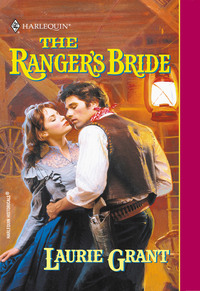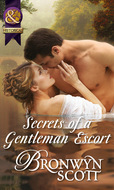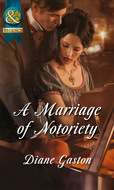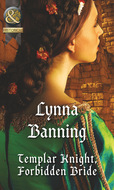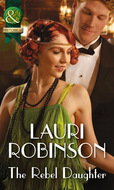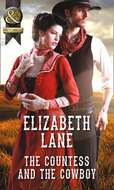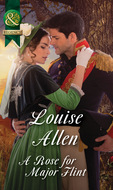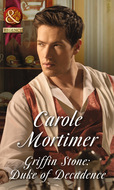Raamatut ei saa failina alla laadida, kuid seda saab lugeda meie rakenduses või veebis.
Loe raamatut: «The Ranger's Bride»
If only she wasn’t a lady, and he just the son of an outlaw!
But she’d seen his smile, and apparently taken it for condescension. “You think it’s funny, don’t you?” she fumed. “That I would want to do something besides sit and sew all day! Ohhh! Men like you make me so angry—!” She whirled away from him. “Well, good night to you, Rede Smith. I shall leave you to your insufferable dreams of male glory!”
Addy turned on her heel and began to stalk out of the barn, but he didn’t want her to go away angry at him, so he reached out and caught her by her wrist.
“Now, Addy, there’s no need to get your feathers all ruffled—”
“I’m sure you don’t think so,” she snapped, trying to wrench her wrist loose, but he held it fast. “Let me loose, you arrogant sidewinder!”
But he couldn’t…!
Dear Reader,
Harlequin Historicals is putting on a fresh face! We hope you enjoyed our special inside front cover art from recent months. We plan to bring this “extra” to you every month! You may also have noticed our new look—a maroon stripe that runs along the right side of the front cover and an “HH” logo in the upper right corner. Hopefully, this will help you find our books more easily in the crowded marketplace. And thanks again to those of you who participated in our reader survey. Your feedback enables us to bring you more of the stories and authors that you like!
We have four incredible books for you this month. The talented Shari Anton returns with a new medieval novel. Knave of Hearts is a secret-child story about a knight who, in the midst of seeking the hand of a wealthy widow, is unexpectedly reunited with his first—and not forgotten—love. Cheryl St.John’s new Western, Sweet Annie, is full of her signature-style emotion and tenderness. Here, a hardworking horseman falls in love with a crippled young woman whose family refuses to see her as the capable beauty she is.
Ice Maiden, by award-winning author Debra Lee Brown, will grab you and not let go. When a Scottish clan laird washes ashore on a remote island, the price of his passage home is temporary marriage to a Viking hellion whose icy facade belies a burning passion….And don’t miss The Ranger’s Bride, a terrific tale by Laurie Grant. Wounded on the trail of an infamous gang, a Texas Ranger with a past seeks solace in the arms of a beautiful “widow,” who has her own secrets to reveal….
Enjoy! And come back again next month for four more choices of the best in historical romance.
Sincerely,
Tracy Farrell, Senior Editor
The Ranger’s Bride
Laurie Grant

MILLS & BOON
Before you start reading, why not sign up?
Thank you for downloading this Mills & Boon book. If you want to hear about exclusive discounts, special offers and competitions, sign up to our email newsletter today!
Or simply visit
Mills & Boon emails are completely free to receive and you can unsubscribe at any time via the link in any email we send you.
Available from Harlequin Historicals and LAURIE GRANT
Beloved Deceiver #170
The Raven and the Swan #205
Lord Liar #257
Devil’s Dare #300
My Lady Midnight #340
Lawman #367
The Duchess and the Desperado #421
Maggie and the Maverick #461
My Lady Reluctant #497
The Ranger’s Bride #550
To Christoval, Texas, home of my grandparents,
the late John Lee and Sally Hill. When I’m writing about
a small town in Texas, I’m thinking of the time I spent
there as a child. And always to my own hero, Michael.
Contents
Chapter One
Chapter Two
Chapter Three
Chapter Four
Chapter Five
Chapter Six
Chapter Seven
Chapter Eight
Chapter Nine
Chapter Ten
Chapter Eleven
Chapter Twelve
Chapter Thirteen
Chapter Fourteen
Chapter Fifteen
Chapter Sixteen
Chapter Seventeen
Chapter Eighteen
Chapter Nineteen
Chapter Twenty
Chapter Twenty-One
Chapter Twenty-Two
Chapter Twenty-Three
Chapter Twenty-Four
Chapter Twenty-Five
Chapter Twenty-Six
Chapter Twenty-Seven
Chapter Twenty-Eight
Chapter Twenty-Nine
Chapter Thirty
Chapter One
Texas, 1874
He looked like an outlaw on the run, she thought, with his lean, sun-bronzed, beard-shadowed cheeks that hadn’t seen a razor in at least two days, his wide-brimmed hat pulled down low enough so he could see, but no one could really see him. She couldn’t determine whether his eyes were brown or as black as his soul inevitably was.
Or maybe he wasn’t an outlaw, but a gunslinger, a man who made his name by the speed of his draw. There was no gun belt around his waist, but the battered saddlebags he kept on his lap looked heavy and lumpy enough to conceal a pair of Colts. His long legs intruded into space in the crowded stagecoach that was rightly hers, causing her to sit slightly sideways so their knees didn’t bump. Sitting sideways, however, forced her either too close to the big sweaty man who kept giving her avid sidelong glances, or the weary-looking old woman who hadn’t said a word all the way from Austin. It was too hot on this early June midday to sit too close to anyone.
What would either an outlaw or a gunslinger be doing on the stage that ran between Austin and Connor’s Crossing? Wouldn’t such a man have his own horse and keep to himself, except when he was robbing or gunslinging or whatever such men did?
Perhaps, though, she was wrong about the man slouched opposite her on the swaying seat. God knew she had been wrong about men before—especially about her husband, Charles Parker. Ex-husband, she reminded herself. After the divorce she’d had her surname legally changed back to her maiden name, so it was time she remembered to think of herself only and always as Adelaide Kelly. It was imperative that no one in Connor’s Crossing ever discover that she was—gasp—a divorced woman. If they did, the respect that had been automatically extended to her as the widowed niece of the late Maud and Thomas Connor would automatically vanish.
Charles—her gambler ex-husband took himself way too seriously to refer to himself as Charley—was nothing like the man seated across from her. A head shorter than the enigmatic stranger and fanatically neat, Charles would never have appeared in public without the benefit of a shave. He would smell of bay rum, and his watch chain, a wedding present from Adelaide, would gleam across his brocade waistcoat—or it would have, if he hadn’t lost it in a game of monte. He’d get it back, he had assured Addy. By that time, though, she no longer believed his promises.
Addy knew now Charles had sniffed out the information that her family had money before he’d ever asked for that introduction three and a half years ago. But at the time, her head had been so turned by his fervent courtship that she had been deaf to her father’s skepticism and blind to Charles’s faults. It was only after she was Mrs. Charles Parker that she’d discovered that her husband had no assets of his own to speak of and that he’d only married her to get ahold of hers. The honeymoon had barely begun when he’d started going through her bank account at such an alarming pace that Addy’s father had counselled Addy to leave him. “It’s the only sensible thing to do, Adelaide, dear,” her father had said.
However, Charles was always promising he’d make it up to her if she just continued to have faith in him. Addy would see—he’d settle down and become a diligent employee at her father’s shipping firm and an excellent husband. But there was always another game, and he’d need to borrow her diamond and ruby earbobs as a stake. Oh, not that she’d need to fear their loss, for he would win this time.
She’d have saved time and heartache if she had left him early on, but pride prevented her from admitting her mistake. So she’d stayed with him for three years even after her inheritance was gone and they’d lost the house her parents had given them for a wedding present. There followed a succession of rented rooms, each one dingier than the last.
The last straw had been when he’d filched her plain gold wedding band off the nightstand while she was bathing and had lost it at poker. She’d gone back to her parents then, and allowed them to pay for her divorce. After all, it was not only the sensible thing to do, it was the only thing left to do.
But she couldn’t stay in St. Louis, Addy had decided. However glad she was to be free of Charles, a divorced woman was still a pariah in society. No, she needed to start over somewhere new.
Her widowed Aunt Maud had written offering her a home with her in Connor’s Crossing. Addy, who had visited there as a young girl and remembered both the house and locale fondly, accepted with gladness and relief. She would have to work for a living, but she had discovered, during those hard times with Charles, an unexpected talent as a seamstress.
She’d been packing to leave St. Louis when word arrived of Aunt Maud’s unexpected death. She had left Addy her house and its small acreage in Connor’s Crossing, on the Llano River on the western edge of Texas’s hill country.
Addy had lived in Connor’s Crossing for a few months now and had been accepted without so much as a ripple of suspicion, for her aunt and uncle had been liked and respected. Today she was returning to the town after a brief trip to Austin, where the selection of fabrics and sewing notions for sale was plentiful.
Suddenly, the stranger across from her straightened in his seat, interrupting her recollections. Lifting the heavy leather flap that kept out most but not all of the road dust, he peered outside, his eyes narrowing as the brilliant afternoon sunlight bathed his lean face. He was unaware of the obvious displeasure of the derby-hatted drummer next to him, who had been peacefully snoring until the lifted flap flooded him with blinding sunlight, and the bony middle-aged woman on his other side, who’d been whining about a migraine all morning.
Angling his head, the stranger peered around curiously. Addy could not see out the stage window because of the way he was holding the flap. He kept it shut on her side, but she supposed she should be grateful, for at least the dust wasn’t coming in on her. But the stranger stared out for so long with a vigilant, narrowed gaze that she finally asked, “Sir, is something wrong?”
It was the first thing she had said to him. A lady was not supposed to speak to a man to whom she had not been properly introduced, even if they were traveling many miles in the same uncomfortable small box.
He sat back and let the flap fall back in place before he answered. “Nope, not that I can see.”
She didn’t believe him, for he had shown no interest in their whereabouts heretofore.
“Oh. Well, did you hear something, then?” she persisted.
“Just wanted to have a look at the countryside, ma’am.”
She studied him for a moment; then, giving up on getting the truth out of him, said, “Excuse me, sir,” to the florid-faced big man sitting next to her and leaned forward to lift her side of the flap.
Rede Smith took advantage of her momentary distraction to appreciate the sweet line of her bosom as she bent from a trim waist to look out the stage window. He’d been covertly looking at her ever since she’d climbed into the stagecoach just ahead of him in Austin. He’d first been transfixed by the graceful sway of her silk bustle, but that was before he had been able to get a good view of her classic oval face with its soft, lush lips, pert little nose and round, green eyes.
He was careful not to leave his gaze on her long enough that she noticed. He had no desire to make her uncomfortable. There was already a wariness about her that didn’t subside except for a brief period when she had fallen into a doze, just outside of Round Mountain. Then he had let his eyes drink her in and savor her rosebud lips, the slenderness of her neck, the rich chestnut hair that framed her forehead and was evidently caught up at her nape in some sort of a twist.
He wished he had been sitting next to her, instead of across from her. Then he could have stolen closer while she slept. It would have been torture to feel the length of his thigh against hers, but still damn well worth it.
Rede, there’s just no use putting yourself through that for a lady. Ladies had no time for a man like him, a man with no permanent home and with a job that could put him on the receiving end of a bullet at any time. A lady wanted a man who was settled, with a little bit of land and maybe a thriving business to boot. A man who didn’t feel he had something to prove. A man who had not been already disgraced by the last name he’d been born with—a name his mother had changed as soon as she’d finally left James Fogarty.
He hadn’t answered the lady truthfully when she’d asked him what was wrong because he could not have said what had made him uneasy and given him that prickling along his spine. He’d been unable to identify its cause as he’d gazed out over the rocky landscape of the Texas hill country. He had seen nothing unusual—not even the telltale flash of metal that could indicate the presence of horsemen hiding in ambush.
He preferred the flatter terrain of farther south—it was harder for Indians or white rascals to hide in that country, where the tallest things in it were scrubby mesquite and knee-high clumps of prickly pear. Anything or anyone could hide in this rolling country of wide, juniper- and mesquite-covered hills and limestone outcroppings.
For the hundredth time he wished he wasn’t in this swaying, rattling box, and had his good roan gelding under him. But he’d known he had a better chance of sneaking into the area without the news reaching the Fogartys if he wasn’t seen riding into town on his roan. Word had a way of spreading fast, as if the wind whispered the news.
“Three Mile Hill,” the woman murmured as she let go of the flap and sat back on her seat. “I’ll be home soon.”
She had a pretty voice, Rede thought. Not high and shrill, or mannishly low, but pleasantly pitched. Not twangy-Texan, either, though it wasn’t nasal or clipped like a Yankee’s. She’d been raised somewhere else, somewhere in the Midwest, he guessed. He wished he could ask her, but knew he wouldn’t.
“You live in Connor’s Crossing?” the big man between her and the window asked her, exhaling down on her so gustily that a loose tendril at her forehead fluttered for a moment.
Rede saw her nostrils flare involuntarily, and guessed she had gotten a potent whiff of the man’s beer-and-onion scented breath. But her smile was polite as she nodded.
“Well, ain’t that nice,” the big man said. “Happens that’s where I’m headed. Gonna set up a business there. Mebbe I could come callin’ sometime, mebbe take you drivin’, soon’s I get me a rig and a hoss.”
“I’m sorry, but I’m a widow,” she said, with a meaningful glance at her clothing.
Rede had been so intent on the sweet curves of her body, he hadn’t noticed she was dressed in half-mourning, a gray dress banded in black. Such shades indicated the death had been some time ago, didn’t it? Several months, or was it a year or more?
He wondered how she had felt about her husband. Had she been devastated by his death? Did she still grieve? A man couldn’t judge by her answer to the big smelly man—most women would have used any excuse not to have that one come calling.
Rede felt a flare of anger, not only that the man had been such an insensitive idiot, but also, he recognized, because the man had made overtures to the very woman Rede wanted himself. A part of him already thought of the woman as his.
If only things had been different. Idiot.
But not as bad an idiot as the big man. He couldn’t imagine the green-eyed woman would have consented to let the malodorous big man call on her even if he’d been the only gent left in Texas.
“Sorry, ma’am,” said the other man. “I jes’ saw you were wearin’ half-mournin’, and I thought maybe it’d been long e…” His voice trailed off, as Rede purposefully intercepted his gaze and narrowed his eyes in warning. “Sorry,” he mumbled.
“Ain’t this the road the Fogarty Gang used to rob the stage along, back before the war?” the drummer asked just then.
The woman’s eyes widened with alarm, and her face paled. Rede longed to slam his elbow into the skinny drummer’s ribs hard enough to make him lose his dinner, just for frightening her.
“But I heard they hadn’t been robbing stages around here for years,” she said. “Ever since—”
“They haven’t,” Rede said flatly, wanting to banish the furrow of worry from her forehead. “Not since m—since Jim Fogarty was hanged.” My father. My father died at the end of a choking rope—years ago.
James Fogarty’s execution for the killing of a stagecoach driver should have taught the rest of the gang a lesson, and it had—for a while. They had lit out to the wild Pecos country for several years. But recently they’d been inching back to their old locale, the limestone-studded hills of central Texas.
“Harrumph. They better keep their eyes peeled and the shotgun ready,” the drummer said, jerking his head to indicate the driver and the stagecoach guard riding up on top.
A lot of good that would do, if the Fogartys wanted to rob this stage, Rede thought, watching the color slowly ebb back into the woman’s face.
He wondered what her name was. Something prim and fancy, he thought. Not harsh, like Harriet, or dowdy-sounding, like Ethel.
Elizabeth, he decided. He wondered if she went by Beth or Liza.
Then all hell broke loose.
Chapter Two
A rifle cracked suddenly from somewhere behind the stoop, followed closely by a sharp cry from the stagecoach driver. Addy heard a thud, then suddenly the team of horses was plunging off the road at a full gallop.
The thin woman with the migraine screamed.
“Bandits! The driver’s shot!” cried the shotgun guard. Addy could hear him scrambling around on top. No doubt he was struggling to grab the dropped reins while still holding the shotgun. Had the thud she’d heard been the sound of the driver’s body hitting the road?
The drummer yanked up the leather flap. “We’re ’bout to be held up!” he shouted.
Many things happened at once. The stranger grabbed for his saddlebags, thrusting a hand into one and coming out with the Colt revolver Addy had suspected was there. The older woman on Addy’s left began to whimper in chorus with the other woman across from her.
Addy was sick with fear. She felt a scream bubbling up inside herself, but the knot of terror in her throat wouldn’t let it out. She wanted to look out the window, but bullets whizzed past and she knew it wouldn’t be wise.
“Get down on the floor!” the stranger ordered Addy and the old women. Then, when the old woman seemed frozen to her seat, he yelled, “Do it! Right now!”
Addy heard him cock his gun, and for a single panicked second, she thought he was in league with the outlaws. Then she decided it was more likely he was trying to get a clear shot at the robbers and didn’t want the two women in the line of fire.
“Get down with me, ma’am!” she cried, pulling at the resisting old woman’s hands. “He’s just trying to help us!” But the woman yanked her hands out of Addy’s, clenched them into a fist at each ear and screamed.
“Whip up those horses there!” she heard the big man yell to the man on top. “We can outrun—”
He never finished his sentence. There was another loud crack, and suddenly he slumped over across Addy. She couldn’t tell where he was hit, but a warm crimson fountain instantly bathed Addy, running down her cheek in a warm, sickening flow.
It was too much. She felt a black mist descend over her, and suddenly there was nothing.
The buzzing of flies at her ear woke her, how much later Addy had no idea. She only knew there was an enormous weight lying against her back, hampering her breathing so that she couldn’t take a full breath. Her nostrils were full of the horrible coppery stench of blood.
She could feel no rise and fall of breathing from the body lying against her, but just to be sure, she took hold of the wrist dangling over her back and felt for a heartbeat. None. The big man who had leered down at her so recently was dead.
Struggling against the horror that was welling up into a scream—which might put her in danger if the outlaws were still around—Addy forced herself to listen, to concentrate on something else besides the corpse partially pinning her down on the stagecoach floor. None of the other passengers remained inside. Where were they? Were the outlaws still outside?
She could hear no voices, neither outlaws calling out orders nor those of the passengers. Nothing but the humming of the flies and the endless soughing of the hot summer wind as it echoed around the limestone hills. Holding her breath so she could hear better, though, she could hear the soft tearing sound horses made as they cropped grass.
Where was everyone else? Were they all dead, too? Would someone shoot her the moment she showed her face outside the coach?
Determinedly, she pushed and wiggled until she had worked herself out from under the dead man and stealthily lifted the flap, pushing herself up just enough to see over the edge.
The hem of a fluttering skirt on the grass was all she could see.
Pushing open the door, she stood at the door for a minute, peering out at the scene before her.
The outlaws were gone. Five bodies lay in the dusty road—the shotgun guard, flat on his back, the old woman, lying on her side as if napping, the drummer, sprawled in an ungainly heap as if he had been kneeling, the thin middle-aged woman who’d had the migraine, looking like a puppet whose strings had been cut, and finally and most horribly, the man who had been sitting opposite her in the stagecoach. He lay prone, his arms outflung in the dirt.
Stifling a moan of anguish, she ran to each of them in turn, finding in each a fatal bullet wound either in the chest or the head.
Addy left the stranger’s body until last, knowing that when she proved to herself he was as lifeless as the others, she would very likely succumb to hysterics. For then she would be truly alone.
She was so shaky she couldn’t be sure if his chest was rising or not. The back of his shirt was streaked with blood. What would she see when she turned him over?
When she took hold of his shoulder and pulled him gently back toward her though, she lost all hope. Blood spread over his shirtfront like a horrible scarlet blossom. No one lived after being shot through the heart.
And then he groaned.
Addy, who had been crouched over him, fell back on her extended elbows.
He groaned again. He was alive! But for how long?
“Mister! Can you talk to me? Wake up! Where are you hit?” Addy cried. His eyes flew open even as he tried to wrench away from her, then settled back with a grunt.
“Easy, now, easy!” she soothed him. “I’m not one of the outlaws! Seems like they’re gone now. I need to know where you’re hit,” she said as she pushed back his rawhide vest and began to unfasten his shirt.
She saw him relax fractionally at her words.
“F-Fogartys,” he muttered.
“You mean you think it was the Fogarty Gang that did this?” she questioned him, as she reached the last button. “Weren’t you the one who said they hadn’t been operating around here since their leader was hanged, years ago?”
He opened his eyes again and looked at her, but she couldn’t tell what he was thinking. She just knew that the eyes she’d thought might be black were brown, but the deepest shade of it she’d ever seen.
Wrenching her gaze away from those fathomless pools, she pushed aside his shirt.
The bullet hole was higher than she’d expected, just over his collarbone. It must have gone in higher than the lung. That’s why he still lived, then. But if the bullet was still in him, he could die of blood poisoning. Reaching down his back, though, she felt a larger, bloodier wound in the back of his shoulder, and breathed a sigh of relief. The bullet had apparently exited there.
He’d shuddered even at her gentle touch, but now the stranger’s eyes drifted shut.
“We’ve got to get you some help,” she said urgently. Then, when he seemed reluctant to reawaken, Addy shook him by his left upper arm.
That brought instant results.
“Judas priest, woman, let go! That hurts like fire!”
Looking down, she saw a bullet hole she’d missed before in the cloth of his sleeve. Easing the shirt down from his shoulder, she saw another wound in the fleshy part of his upper arm. Probing the muscle with careful fingers, she could not find a second hole. That bullet must still be in there.
A horse whinnied behind her, and Addy darted a look over her shoulder, half expecting to see the outlaws had returned to finish them off. But it was only one of the team, still hitched to the stagecoach.
“Fogartys…they’ll come back….” he muttered.
They had to get out of here, and get him to a doctor, but how? It wasn’t as if she could carry him, and from the pallor beneath his sun-bronzed face, he sure couldn’t walk the two miles to her place.
There was only the stagecoach—and of course she’d never driven one. The body of the dead man was still inside it. But what other choice did they have?
Addy touched the man’s other shoulder to rouse him. “Mister, we’ve got to get you out of here, get you to some help,” she said, nervously eyeing the horizon lest the outlaws come galloping over it.
He didn’t open his eyes. “Everyone’s dead….”
She nodded, though she knew he couldn’t see her. “Yes, everyone’s dead, except you and me.”
“Just…witnesses. ’Sposed to be me….”
She didn’t know what he meant by that, and at the moment, she didn’t care. “Look, we’re going to have to get you into the stage. That big man who was sitting next to me is lying dead in there, but I can’t move him, and neither can you.”
He shrugged, a movement that instantly made him groan in pain. “I’ve been around dead bodies before.” He opened his eyes, and pierced her with his dark gaze. “You ever driven a stage team?”
She fought the urge to laugh hysterically. “No, of course not. But looks like I’ll have to try, doesn’t it?”
His mouth twisted wryly. “Don’t think I could climb up on top if I had to….”
“No, of course not.” She squared her shoulders. “Well, you’re going to have to help me get you to your feet.”
He’d closed his eyes again. For a moment he was so still, she thought he’d passed out; and then he reached inside his vest and fumbled at something for the longest time.
“Whatever you’re trying to find can wait,” she said. “We need to hurry and get you to a doctor.”
Opening his eyes again, the man shook his head. “No doctor…” He held out his hand, the one that had reached inside his vest. His fingers were folded around something. “Here—put this…on one of the men. The shotgun guard.”
Her eyes locked with his, Addy allowed him to drop the object into her hand. Its hard coolness told her it was metal before she looked down.
When she did, Addy was startled to see it was a lawman’s badge. She squinted in the strong afternoon sunlight. It was the badge of a Texas Ranger.
Her eyes flew to his face. “You’re a Ranger? I thought…” She shut her mouth before she could say, “I thought you were an outlaw or a gunslinger,” but his raised brow and the wry twist of his mouth told her he’d guessed exactly what she’d been thinking.
He was too pale, and the sun above, too fierce. She had to get him to shelter. “Well, never mind. I’ll do as you said.” Later, she would find out why he wanted her to make it look as though the dead shotgun guard had been him.
Addy avoided the sight of the dead guard’s staring eyes, but couldn’t help flinching as she pierced the blood-caked cloth with the pin of the badge.
She came back to find the Ranger struggling to his feet, his left arm dragging. He swayed, and she was just in time to put her shoulder underneath his arm to brace him.
His face had gone gray with the effort, but his gaze was direct as he spoke. “From what you said earlier, sounds to me as if you live a ways outside town?”
Puzzled, she nodded. “About a half mile this side of Connor’s Crossing. We’re just a couple of miles away.”
“That’ll do. You can take the bullet out there.”
“I can’t remove a bullet—I’m no doctor!”
“Lady, there’s men lookin’ t’ kill me, and they will if it gets ’round that the doctor’s been called to tend some fellow wounded in a stage robbery. I reckon if you don’t care about that, you can take me on into town.”
“Well, of course I don’t want you killed,” she protested. “But don’t you see, I can’t…”
“Look, lady, whatever you decide is fine by me,” he snapped. “I don’t have the strength to stand here and argue with you. Let’s just get out of here, all right?”
Startled at his tone—and embarrassed that she’d forgotten how much blood he’d lost and how much pain he must be feeling—she nodded.
He gave her a wan smile. “Sorry, I didn’t mean to bite your head off. If you can hold the horses steady, I think I can climb in.”
